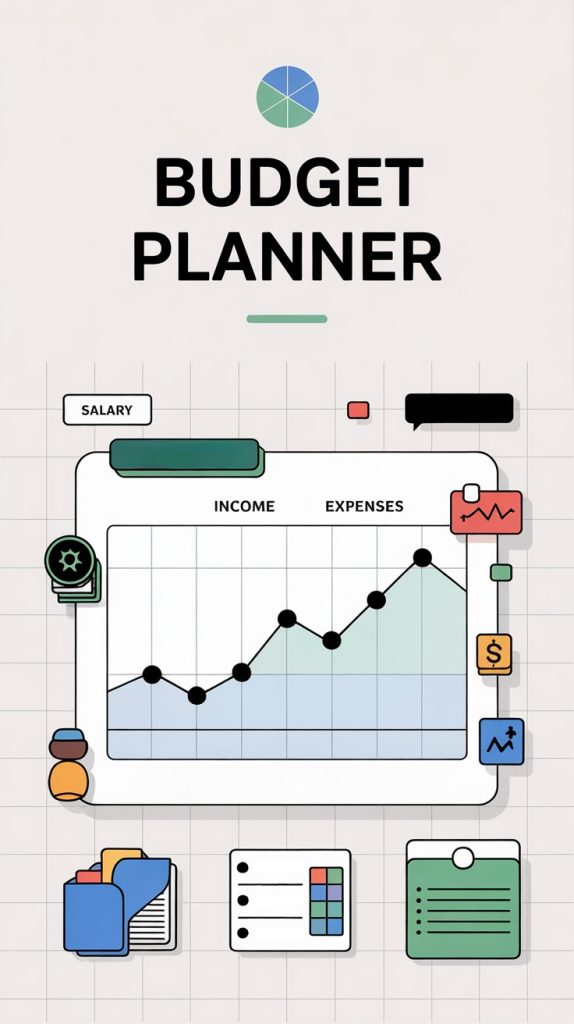Money Tips & Advice for 20-Somethings
Let’s talk about financial goals for your 20s because this is a pivotal time for you. The decisions you make now, will lay the groundwork for your entire financial future.
So getting it right will set you up for life.
Big changes are happening – careers kicking off, maybe moving out, tackling student loans. There’s a lot going on.
But right in the middle of all that, you’ve got this amazing chance to create smart money habits that’ll seriously pay off.
And that’s exactly what we’re going to talk about – getting your financial house in order.
We’ll focus on creating a solid safety net, locking in good money habits, being serious about reaching your savings goals, and investing goals.
To give you a clear picture of what we’ll cover, here’s a rundown of the top financial objectives every 20-something should know…
Disclosure: Our website is reader-supported. If you purchase any service through our partner links, we may earn a commission at no extra cost to you.
Table of Contents
1. Know Where Your Money Goes
The first step to good money management is understanding how much you earn and spend each month. This should be your first priority because without what direction to move, you’re moving aimlessly.
In your 20s, don’t be hard on yourself if your net worth is in the negative – that’s okay. Most of us start with building from the ground up, and that’s totally normal.
Next, as yourself, where is your money going? What are you spending on? Do you have any investments yet, like a 401(k) or Roth IRA? These should be priorities, not something to put off for later.
Action Items:
- Track Your Spending – Use a budgeting app or spreadsheet to list everything you buy.
- Check Your Net Worth – Add up what you own (bank savings, investments) and subtract what you owe (loans, credit cards). This gives you a big-picture view of your finances.
2. Create a Simple Budget
If you’re not sure where your money goes, having a budget will guide you in the right direction. This will show you exactly where each dollar is spent.
Try not to look at following a budget as a “restriction”, but more so about clarity and making informed choices.
A budget helps you control your money instead of wondering where it went.
This is an important habit to build as you work toward your long term financial goals.
Action Items:
- Use the 50/30/20 Rule for Budgeting – Spend 50% on needs (rent, food), 30% on wants (fun, shopping), and save at least 20%.
- Adjust as Needed – If you overspend in one area, cut back somewhere else. Keep adjusting your budget until it works for you.

3. Build an Emergency Fund
Life doesn’t always go as planned – medical bills, car trouble, or suddenly losing your job can happen when you least expect it.
An emergency fund is your financial buffer, helping you stay afloat without relying on credit cards or loans.
Start by saving $1,000, then work toward 3–6 months of expenses. Focus on covering the basics: rent, food, utilities, insurance, and transportation.
Building an emergency fund is not just about money, it’s about peace of mind and a solid savings strategy.
Having an emergency fund means you’re prepared for whatever life throws your way.
Action Items:
- Save 3-6 Months of Expenses – This covers rent, food, and bills if you lose your job or have a big unexpected expense.
- Keep It Separate – Put it in a high-yield savings account so it’s easy to access but not too tempting to spend.
4. Pay Off High-Interest Debt
High-interest debt, like credit cards or payday loans, can drain your income and slow your financial growth.
The longer it lingers, the more you pay in interest, making it harder to get ahead.
Focus on knocking out these debts first. Use strategies like the avalanche method (highest interest rate first) or the snowball method (smallest balance first) to build momentum.
Paying down your high-interest debt frees up your money, reduces stress, and puts you back in control of your financial future.
Your long term financial goals should always aim to include as little ‘bad debt’ as possible, especially from consumer purchases.
Action Items:
- Tackle Credit Cards First – Credit cards have one of the highest interest rates which can go as high as 30%+. Pay more than the minimum payment each month to clear them faster.
- Consider Debt Snowball or Avalanche Methods – The snowball method means paying off small debts first for quick wins, while the avalanche method focuses on high-interest debts first to save money.

5. Build Good Credit
Your credit score is more than just a number, it’s your financial reputation.
Think of it as a report card that lenders, landlords, and even employers check to see how responsible you are with money.
A strong credit score can help you qualify for lower interest rates on loans, better rental options, and even boost your chances of landing certain jobs.
To build good credit, pay bills on time, keep credit card balances low, and avoid unnecessary debt.
The higher your score, the more doors you can open.
Action Items:
- Pay Bills on Time – Set reminders or use autopay so you never miss a due date.
- Use Credit Cards Wisely – Keep your balance low and pay it off in full each month.
- Check Your Credit Report & Maintain a Healthy Credit History – Check your credit for free with Credit Karma to spot errors and make improvements.
6. Start Saving for Retirement
Retirement might feel like a lifetime away, but time is your biggest advantage when it comes to building wealth.
The earlier you start, the more you benefit from compound interest – where your money earns money over time.
Even small contributions to a 401k, IRA, or Roth IRA can add up significantly if you stay consistent.
If your employer offers a match, take full advantage – it’s basically free money.
Future you will thank you for starting early. The earlier you start, the easier it is to grow your wealth.
Start saving for long term financial goals like retirement early.
Action Items:
- Use a 401(k) if Your Job Offers It – Contribute enough to get the full company match, it’s free money!
- Open an IRA – If you don’t have a 401k, look into a Roth or Traditional IRA for tax benefits.

7. Invest Your Money
Saving is a great first step but investing is what truly grows your wealth over time.
While savings accounts are safe, they often don’t keep up with inflation.
Investing allows your money to work for you through assets like stocks, index funds, or real estate.
Start small and stay consistent. The key is to invest regularly and think long term.
With time and patience, your money can grow far beyond what simple saving can achieve.
Action Items:
- Start Small – You don’t need a lot of money to get started.
- Think Long-Term – Focus on index funds like the SPY or QQQ and avoid risky investment options or get-rich-quick schemes.
8. Make More Money
Relying on a single income stream can limit your financial growth and leave you vulnerable if that paycheck stops.
Finding ways to earn extra income, whether through a side hustle or freelance work, can fast-track your wealth-building goals.
More income means more flexibility. Why? Because you can pay off debt faster, invest more, and save for big goals without feeling stretched thin.
Diversifying your income is one of the smartest moves you can make because in today’s economy, relying on one paycheck can be risky.
Action Items:
- Get a Side Hustle – Freelancing, selling online, or tutoring can bring in extra cash.
- Ask for a Raise – If you’re a great employee, research salary trends and talk to your boss about a pay bump.

9. Get the Right Insurance
Insurance isn’t just a monthly bill, it’s a financial safety net that protects your money and assets from big losses. This is a must for your long term financial goals.
Whether it’s health, auto, renters, life, or disability insurance, having the right coverage protects you from major losses that could wipe out your savings.
The goal isn’t to over-insure, but to be prepared.
One unexpected event, like a car accident or medical emergency and it can cost thousands.
The right life insurance policy or alternative insurance keeps your financial goals on track, even when life doesn’t go as planned.
Action Items:
Consider reviewing or adding insurances that are applicable to you.
- Health Insurance – Medical bills can be expensive. If you don’t have work benefits, look for affordable plans.
- Renter’s Insurance – Covers your stuff if there’s a fire or theft. It’s usually cheap but worth it.
- Disability Insurance – Protects your income if you can’t work due to an accident or illness.
- Life Insurance – Add a whole or term life insurance to protect your family.
10. Set Personal Money Goals
Having clear money goals gives your money a purpose. Whether you want to pay off debt, buy a home, travel more, or build a six-figure investment portfolio – having specific goals keep you focused and motivated.
Break big goals into smaller milestones, and track your progress regularly.
When you know exactly what you’re working toward, it’s easier to stay disciplined and make smart choices towards your long term financial goals.
Your money should work for your dreams, not the other way around.
Action Items:
- Short-Term Goals – Save for a vacation, pay off a small debt, or build an emergency fund.
- Long-Term Goals – Buy a house, start a business, or retire early.
- Make a Plan – Write down your goals and break them into small steps.
11. Learn About Money
When it comes to money, one of the smartest moves you can make is just learning how it works.
Whether you’re new to personal finance or just curious about investing, building your knowledge base is important.
A great place to start is by reading one book. Just one.
Pick a topic that speaks to you – saving, mindset, investing, budgeting – and commit to reading it all the way through.
The book that changed my perspective on money and taught me a lot about my mindset around money and long term financial goals is the book called The Psychology of Money.
I encourage you to read this book as a starting point.
The more you know, the better decisions you’ll make.
Action Items:
- Read Personal Finance Books – For more finance tips and financial advice, “The Psychology of Money” or “I Will Teach You to Be Rich” are great places to start.
- Follow Finance Blogs & Podcasts – Stay updated on new money tips and investment strategies.
- Take a Finance Course – Many free courses online teach budgeting, investing, and wealth building.
12. Give Yourself Some Fun Money
Managing your finances doesn’t mean cutting out all the fun. In fact, giving yourself a little spending room is key to staying consistent with your money goals.
Set aside a small portion of your budget (guilt-free) for things you enjoy, whether it’s dining out, hobbies, or the occasional splurge.
When fun is part of your plan, it’s easier to stick to your budget long term without feeling restricted.
Balance is the real secret to financial success.
Action Items:
- Plan for Enjoyment – Set aside some cash for entertainment, hobbies, or dining out.
- Don’t Feel Guilty – If you budget responsibly, it’s okay to treat yourself once in a while.

FAQ
What are the best financial goals to set in your 20s?
Start with the basics: build an emergency fund, pay off high-interest debt, and start investing… even if it’s just a small amount. These foundational goals set you up for long-term financial freedom and reduce money stress early.
How do I build long-term wealth in my 20s?
Building wealth in your 20s comes down to consistency: automate your savings, invest regularly, and avoid lifestyle inflation. The earlier you start, the more time compound interest has to work its magic.
Why is it important to set financial goals in your 20s?
Your 20s lay the groundwork for your entire financial future. Clear money goals help you avoid debt traps, grow your net worth, and give you more freedom and options later in life.
Final Thoughts
Your 20s are the perfect time to build strong financial habits. Start by setting clear goals around your money and do your best to commit to it as best as possible.
These key points will help you master your finances, not just in your 20s, but for years to come.
- Know Where Your Money Goes
- Create a Simple Budget
- Build an Emergency Fund
- Pay Off High-Interest Debt
- Build Good Credit
- Start Saving for Retirement
- Invest Your Money
- Make More Money
- Get the Right Insurance
- Set Personal Money Goals
- Learn About Money
- Give Yourself Some Fun Money
Stay committed and prioritize building strong money habits. I look forward to hearing about your story!
Send me a comment for any questions.
👉 Follow me on Pinterest for more tips on wealth, money and business!
More Reading About Financial Goals in Your 20s
- 40 Must-Know Financial Terms for Beginners
- How to Lower your Life Insurance Premiums
- Roth IRA Stock Investing Tips to Build Wealth
My Favorite Tools
To help you reach your financial goals in your 20s, below are resources you can use to get started. Most are free to sign up and will support your money goals.


Leave a Reply